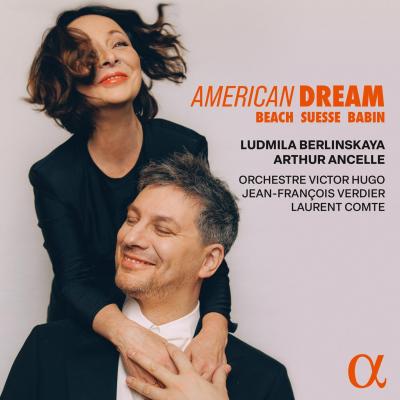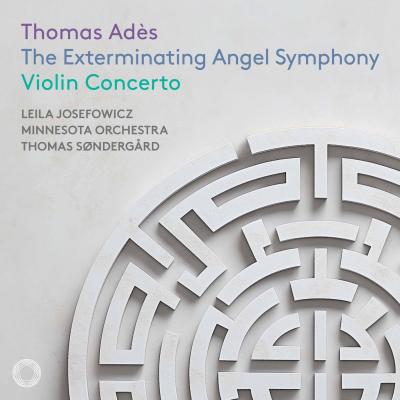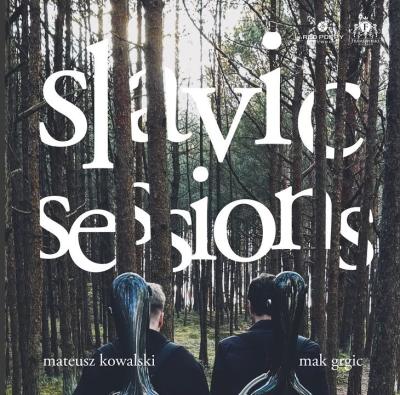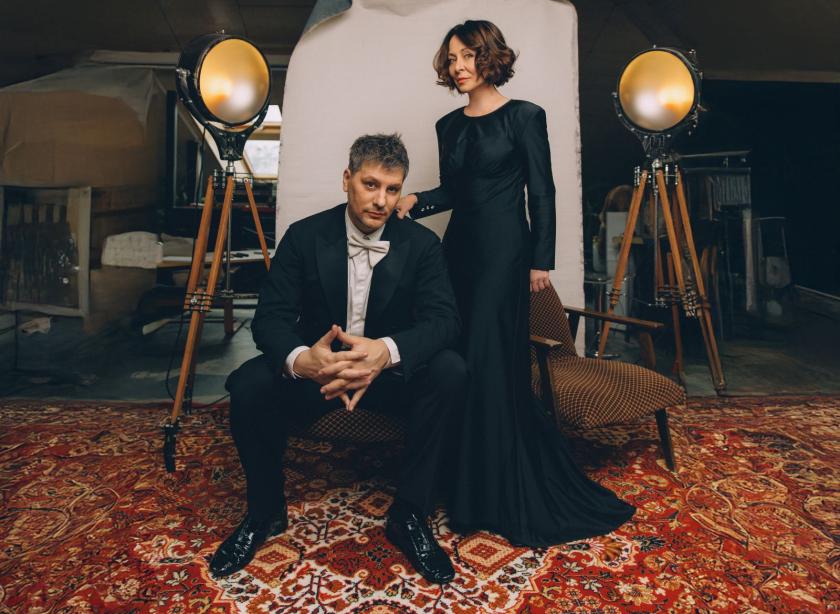
American Dream: music by Amy Beach, Dana Suesse and Victor Babin Ludmila Berlinskaya and Arthur Ancelle (pianos), Orchestre Victor Hugo/Jean-François Verdier and Lauren Comte (Alpha Classics)
Wife and husband two-piano duo Ludmilla Berlinskaya and Arthur Ancelle have form when it comes to exhuming rare repertoire, and this new anthology doesn’t disappoint. Amy Beach’s name was on my radar, but Dana Suesse and Victor Babin were new to me. Learning about their backstories proved to be as interesting as hearing their music. Take Dana Suesse (1909-1987), a child prodigy from Kansas City whose improvisational skills were apparent when she first began performing. Suesse later studied with Alexander Siloti but struggled to earn a living from performing and composing. Churning out the occasional pop song was a useful sideline (listen to her 1931 hit “Ho Hum”) – in Suesse’s words, “I have to earn my living, and I want to write serious music, so I spend fifteen minutes now and then writing a popular song.” Bandleader Paul Whiteman recognised Suesse’s talents and she was even Robert Russell Bennett’s tennis partner; his recommendation allowed Suesse to study with Nadia Boulanger in the late 1940s.
Sadly, respect as a serious composer continued to elude her though songwriting royalties provided a useful income. Her Concerto for Two Pianos and Orchestra was mostly written in the late 1930s, a compact work that feels at times like two separate works glued together. Suesse’s first two movements are brooding and noirish in tone, her scherzo and finale brighter. That concise last movement is delicious, brilliantly played here by Berlinskaya and Ancelle. The solo writing is idiomatic but never showy; turn to Amy Beach’s Suite for Two Pianos founded upon old Irish melodies for something more overtly pianistic. Written in 1924, Beach found her melodies in a popular magazine, her virtuosic treatment gleefully at odds with the naivety of the source material. The “Old-time Peasant-Dance” has a thrilling sweep, and one shudders to think at what might be going on in “The Ancient Cabin”, the music’s heady intensity as alarming as it’s exhilarating. If you’re searching for a nifty new work for two pianos, try this. The playing is sensational.
Last comes the Concerto No. 2 for Two Pianos and Orchestra by Victor Babin, born in Moscow in 1908 and one half of a renowned duo with his wife Viktoria Vronskaya. Emigrating to the US in 1937, the couple specialised in two-piano transcriptions and became close friends of Rachmaninov and Stravinsky. Babin’s neo-classical first movement suggests a mixture of Copland and Prokofiev, the transparent scoring allowing every detail in the piano writing to register, the mood cool, ironic even, but instantly appealing. Berlinskaya and Ancelle are compelling bit part players in the eerie third movement cadenza, every utterance telling, and the finale’s fugal writing is immaculate. And just when you think the concerto is going to fizzle out into silence, Babin throws in a punchy, affirmative coda. It’s an enjoyable and intriguing work which repays repeated listening. Both concertos are snappily accompanied by the Orchestre Victor Hugo, Jean-François Verdier and Lauren Comte sharing conducting duties, and the disc, recorded in Besançon in Eastern France, is ripely engineered. A winner.

Thomas Adès: Violin Concerto, The Exterminating Angel Symphony Minnesota Orchestra/Thomas Søndergård, Leila Josefowicz (violin) (Pentatone)
Thomas Adés’s Violin Concerto (originally subtitled ‘Concentric Paths’) is already very well represented on disc for a piece that was only premiered in 2005 – I counted six other releases, but I might have missed some. This is a welcome addition to the discography from a soloist, Leila Josefowicz, who has very much made the piece her own, playing it over 60 times live. This recording, with the Minnesota Orchestra, is taken from one of those live outings, and captures the energy and excitement that can be lost in a studio recording. The violin writing is often very high, and Josefowicz in that register is sometimes floaty and sometimes piercing. It is intense music, although some of the best passages are the occasional moments of quiet. The scoring is spare, but Adès, always a master of his forces, makes every note tell. The finale builds to a wild dance, with echoes of Stravinsky’s own Violin Concerto in its rhythmic irregularities and strident solo part: Josefowicz is combative and assertive.
Recent Adès has had success with orchestral suites from his operas – in April I reviewed for this column the LPO release of suites from Powder Her Face and The Tempest – the latter in particular I prefer to the actual opera. And now here is the premiere recording of a 2020 selection from The Exterminating Angel, the opera first heard in 2016. The opera is a dark comedy and ripe material for Adès larger-than-life orchestral imagination. There is more than a hint of the grotesque in ‘Entrances’, conductor Thomas Søndergård pulling the music to and fro. ‘Marches’ offers a Prokofiev-like drama, accompanied by an insistent snare drum, followed by an abrupt change of tone in ‘Berceuse’, which is tender and lyrical, with a Hollywood sweep and swoon. The finale, ‘Waltzes’, has a hint of Ravel’s Valses Nobles et Sentimentales, but with less Gallic refinement and a more muscular heft. The Exterminating Angel Symphony is an impressive piece on its own terms, even without its operatic context, and a successful addition to Adès’s orchestral oeuvre. Bernard Hughes

B.A.C.H. - Bach arrangements for clarinets and various instruments Martin Fröst (clarinet) with Sebastien Dubé (double bass), Göran Fröst (viola) Anastasia Kobekina (cello), Jonas Nordberg (lute) and Benny Andersson (piano) (Sony Classical)
This album is evidently a very personal project for the Swedish clarinettist. It certainly feels more like Fröst's own direct creation than, say, his Vivaldi (Sony, 2020) which bears a strong imprint from German arranger (and ex-oboist) Andreas Tarkmann Here, Fröst has adapted a sequence of short Bach pieces to play on the clarinet with various instrumental forces - double bass, or viola, or cello, or theorbo, and even Benny Andersson from ABBA on piano (sic!)...B.A.C.H. is supposed to stand for ‘Beyond All Clarinet History’, and the programme on the album stems from a series of concerts with that title. There is strong variety here, sometimes just a single clarinet line, but also various kinds of rearranging and overdubbing.
That level of variety made me want to try and single out what it is about Martin Fröst that makes him not just a unique clarinettist but also such a special musician. I went back and listened to him playing Messiaen’s “Abîme des Oiseaux” and compared his version with that of another clarinettist with similarly superhuman control of the instrument - and another former Hans Deinzer pupil -the late Wolfgang Meyer, brother of Sabine, who recorded the Quatuor pour la fin du temps with Yvonne Loriod. Both clarinettists play the solo movement impeccably, but whereas Meyer dazzles with demonstration quality, as one effect after another is perfectly nailed, what Fröst does is to really join it all up, make sense of it, believe and prove that the “Abîme” can flow as a story.
And that is exactly what happens in different ways time and again here. The Allemande from the 5th French Suite, co-arranged with lutenist Jonas Nordberg has Fröst carrying the melodic line with poise, charm and total conviction. The opening “Air” from the Goldbergs, played on a Buffet boxwood instrument is equally persuasive. One track irritated me: Bach/Gounod’s “Ave Maria” CG89 receives André Rieu-ish self-indulgence from cellist Anastasia Kobekina.
In recent interviews, Fröst has been reflective on how his career has changed from the early days when he interpreted (and also instigated) highly complex contemporary works into where he is now, offering something more far communicative. He has summed up his ambitions as a musician in this phrase: “I want to be just a small part of the wind changing direction.” This is a highly persuasive album and proof that he has indeed found a successful way to move with the times. Sebastian Scotney

Poulenc: Piano Works Paul Berkowitz (Meridian)
Francis Poulenc’s Fifteen Improvisations span a large chunk of his career – ten written between 1932 and 1934, the final one composed in 1959. Most last around two minutes; all are echt-Poulenc, pithy distillations of this deeply lovable composer’s essence. Having them all in sequence on a single disc makes sense, Canadian pianist Paul Berkowitz dispatching them as if they were actual improvisations. There’s so much to love here: try No. 3, its opening gesture looking ahead to Poulenc’s gorgeous Piano Concerto, the central section’s lyrical theme underscored by constant harmonic sidesteps. Try humming along – it’s impossible. No. 11 was composed under Nazi occupation as a sight-reading exercise for the Paris Conservatoire and No. 15 pays tribute to Edith Piaf without directly quoting any of her songs. Berkowitz’s flowing tempo feels just right, an affectionate tribute rather than a maudlin lament.
Poulenc’s Three Novelettes took even longer to complete, with two written in the late 1920s and the third, based on a theme by Manuel de Falla, added in 1959. Listen to them in sequence and you’ve a handy ten-minute encapsulation of Poulenc’s musical development, brittle wit yielding to heartfelt introspection. Berkowitz’s readings of the Three Intermezzi and Three Novelettes are equally winning, the disc concluding with superb renditions of Poulenc’s Thème Varié, and Mélancolie. The latter’s closing bars usually make me well up; this performance left me in pieces. Lovely, life-enhancing stuff, and an album to dip into and savour. Berkowitz’s notes are excellent and Meridian’s sound is rich and detailed.

Slavic Sessions Mak Grgić and Mateusz Kowalski (guitars) (Red Poppy/Frameworks)
I’ve long had a soft spot for a good transcription, and the three opening tracks of Slavic Sessions tick all the right boxes. The cover art shows Slovenian/Polish guitar duo Mak Grgić and Mateusz Kowalski entering a woody landscape, forests being central to Slavic folklore and mythology. Jerzy Koenig’s idiomatic arrangement of Chopin’s Op. 9 Nocturne in B-flat minor is warm and intimate, and a pair of Dvořák Slavonic Dances fizz. Sample the famous G minor furiant (here transposed into E minor), its cross-rhythms and gear changes immaculate.
The most substantial work is Polish Impressions by guitarist and composer Marek Pasieczny, a 2017 sequence of 12 folk songs. Pasieczny’s arrangements are ear-tickling, preserving the originals’ quirkiness with plenty of harmonic and rhythmic grit. A pity that more information about the individual melodies isn’t given – who’s the protagonist in “Raged, She Raged”, and what do the loud taps at the song’s close signify? Other titles alude to brick basements, lime trees and domestic visitors. “Sleep, Now Sleep” and “The Dusk Falls Silently” are highlights, each an introspective jewel. Grgić and Kowalski relish the silences; there are moments when you daren’t catch your breath. Two numbers by Bosnian composer Miroslav Tadić close the disc, his "Walk Dance No. 2" a dizzying folksy stomp. Nicely recorded in the wood-lined Koszalin Philharmonic Hall, this is an appealing collection.















Add comment